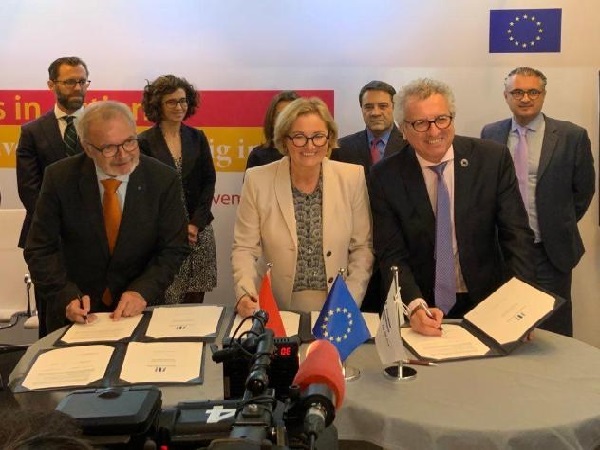 Credit: © EIB
Credit: © EIB
Luxembourg and the European Investment Bank (EIB) have announced their commitment to working ever more closely together on two of their joint priorities: the development of the microfinance sector in African, Caribbean and Pacific (ACP) countries and the fight against climate change.
At the EIB’s annual Donors Conference, held in Luxembourg on Tuesday, Luxembourg and the EIB launched a Financial Inclusion Fund, dedicating €3.6 million to support for micro and small businesses in the ACP. They also agreed to extend the Luxembourg-EIB Climate Finance Platform (LCFP), which was originally established in 2017 for a period of three years.
The new Financial Inclusion Fund is jointly financed by Luxembourg’s Ministry of Finance and Ministry for Foreign and European Affairs. It aims to facilitate access to financial services for micro and small businesses in less developed and low-income, but also middle-income, countries in the ACP region. Primarily earmarked for technical assistance, the fund is designed to strengthen the capacity of EIB microfinance counterparts, making them more sustainable and stronger. It will be open to contributions from other donors.
The LCFP, a fund endowed with an initial €30 million by the Grand Duchy, has been investing in projects with a strong impact in the fight against climate change since 2017. The partners have now decided to prolong their cooperation, with Luxembourg committing another €40 million to the fund. In a letter of intent signed by EIB President Werner Hoyer and Luxembourg’s Minister of Finance, Pierre Gramegna, and Minister for the Environment, Climate and Sustainable Development, Carole Dieschbourg, the partners agreed to extend the lifetime of the fund until 31 December 2024 and to open it up to other donors.
At the EIB headquarters in Luxembourg, Werner Hoyer stated: “I am particularly pleased to announce these two initiatives with the Grand Duchy today. Luxembourg is not only the host of the European Investment Bank, it is also one of our key bilateral donors. Our continued fruitful cooperation shows that the EU bank is especially suited to supporting the individual development goals of EU countries and private donors. We address critical funding gaps by blending loans with grants from our partners. These innovative blending solutions ensure a high impact – for donor countries and institutions as well as for people in the project regions.”
Finance Minister Pierre Gramegna added: “Donor governments can make a vital contribution to the EIB’s work by providing funds that leverage private capital, bridge the financing gap and de-risk projects in developing countries. Luxembourg and the EIB have an impressive track-record in innovative financial solutions like the EIB-Luxembourg Climate Finance Platform which contributes to climate change mitigation and adaptation. I welcome the two initiatives that are being signed today as they will further strengthen our cooperation aiming to achieve the Sustainable Development goals”.
For her part, Paulette Lenert, Minister for Development Cooperation and Humanitarian Affairs, said: “Luxembourg has grown to become a key centre of excellence for inclusive finance. Together with the EIB, through our joint proactivity, we have been at the forefront of developing instruments that are specifically designed to raise money for the implementation of the sustainable development goals, like the Financial Inclusion Fund, thereby effectively creating an ecosystem that nurtures and supports innovation”.
In addition, Carole Dieschbourg commented: “Collective climate action by governments and businesses will lead to the achievement of about 75% of the commitments set out in the Paris Agreement. This shows why we must aim for successful, fair and transparent cooperation if we want to build a safe and climate-resilient future. The Luxembourg Government commits to reaching net-zero greenhouse gas emissions by 2050”.
The EIB’s Donors Conference is an annual event which seeks to showcase donor-financed activities and facilitate dialogue with donors on future partnerships. This year’s conference addressed a range of questions, such as: Why do we need to bridge the financial inclusion gap? How can financial assistance support local businesses and entrepreneurs? What conditions need to be met to encourage private investment?








